2010 年云南昆明理工大学英语考研真题 A 卷
Part I
Vocabulary and structure
(20%)
Directions: In this section, there are 40 sentences. For each sentence there are
four choices marked A), B), C) and D). Choose one of the words which is
closestinmeaningtotheunderlinedwordortocompletethesentenceand
markyouranswerontheanswersheetwithasinglelinethroughthecenter.
1. I don't think Michael could
another night without sleep.
A. stand
B. support
C. reserve
D. retain
2. The river has
five feet and threatens to overflow its banks.
A. raised
B. been raised
C. risen
D. arisen
3. Here are some toys. You can
one or two for your little son as a birthday
gift from me.
A. single out
B. pick out
C. carry out
D. work out
4. On entering another country, a tourist will have to
the Customs.
A. go through
B. go by
C. go over
D. go in for
5. You will soon
this climate and then the changes in temperature will not
affect you.
A. get used to
B. get to
C. get over
D. get on with
6. We were
for half an hour in the traffic and so we arrived late.
A. put back
B. broken down
C. held up
D. kept off
7. In this way, smokers will know which brands are most
to affect their health.
A. definitely
B. likely
C. naturally
D. certainly
8. When there's a doubt, the chairman's decision is
.
A. right
B. definite
C. fixed
D. final
9. It was difficult to guess what the old woman’s
to the bad news would be.
A. impression
B. response
C. comment
D. estimate
10. To our delight, she quickly adapted herself
the new environment.
A. with
B. to
C. of
D. into
�
11. His few personal belongings made it possible for him to move from place to
place_____________.
A. in ease
B. at ease
C. with ease
D. with easiness
12. Prior
his departure, he addressed a letter to his daughter.
A. to
B. of
C in
D. from
13. I sent invitations to 80 people,
have replied.
A. of whom only 20 of these
B. only 20 of these who
C. of whom only 20
D. only 20 who
14. No sooner
than the accident happened.
A. he had gone
C his going
B. had he gone
D he went
15. I would have come to see you had it been Possible, but I
so busy then.
A. had been
B. were
C. was
D. would be
16. He is
of a musician.
A. anybody
B. anyone
C. somebody
D. something
17. I regret
harder at school.
A. not to have worked
B. not having worked
C. not have worked
D. having not worked
18. We carved their names on the stone
future generations should know what
they had done.
A. in order that
B. now that
C. in order
D. lest
19. Kubrick told his son to have his shoes
.
A. shone
B. shining
C. shined
D. polishing
20. Sue hasn’t paid her share of rent, so she
a job yet.
A. would not find
B. had not found
C. must not have found
D. did not find
21. Several of these washers and dryers are out of order and _________ .
A. need to be repairing
B. repairing is required of them
C. require that they be repaired
D. need to be repaired
�
22. He preferred to continue his work
rest on his achievements.
A. rather than
B. other than
C. better than
D. more than
23. There are nine planets in the solar system,
are larger than our earth.
A. some of that
B. some of whose
C. some of which
D. some of them
24. John
a restless person. He kept moving from country to country.
A. must be
B. should be
C. must have been
D. should have been
25. When the fire broke out,
.
A. the house became emptying
B. the house had empties
C. the house had emptied
D. the house was made empty
26. It is no good
remember grammatical rules. You need to practise what you
have learned.
A. trying to
B. to try to
C. try to
D. tried to
27. A force can make a body
around a point which is not in its line of action.
A. rotating
B. to rotate
C. rotate
D. rotated
28. The president approved of the requirement that all graduating students in the
college
a thesis.
A. must write
B. wrote
C. write
D. ought to write
29.
occasional differences in opinion, Ron and Paul get along very well.
A. Except for
C. In spite of
B. Out of
D. In addition to
30.
I came to China
I knew what kind of country she is.
A. It is not until / when
B. It is until / that
C. It was not until / then
D. It was not until / that
31. He was
from the firm because he was always late for work.
A. sacked
B. retired
C. discarded
D. disposed
32. I will never
them to take the child away from me.
A. let
B. tolerate
C. allow
D. admit
�
33. The mail was ______ for two days because of the snowstorm.
A. held back
B. held out
C. held up
D. held on
34. I could just see a car in the distance, but I couldn't
what color it was.
A. make out
B. look into
C. look out
D. take in
35. This border incident led to the two countries ______ diplomatic relations in
1965.
A. breaking up
B. finishing
C. cutting out
D. breaking off
36. It isn't quite
that he will be present at the meeting.
A. sure
B. right
C. certain
D. exact
37. The traffic is very
. It’s quicker to walk.
A. noisy
B. narrow
C. near
D. heavy
38. The actual cost of the building was much higher than our original
.
A. consideration
B. judgment
C. estimate
D. plan
39. John was seriously ill and left school
his will.
A. at
B. in
C. to
D. against
40. This pair of shoes isn’t good, but that pair is
any better.
A. rather
B. less
C. ever
D. hardly
Part II
Reading Comprehension
(40 points,)
Directions: In this section there are 4 passages. Each passage is followed by 5
questions or unfinished sentences. For each of them there are 4 choices
marked A, B, C and D Choose the best answer and mark your choice on the
ANSWER SHEET with a single line through the center.
Passage
1
Thirty-one million Americans are over 60 years of age, and twenty-nine million of
them are healthy, busy, productive citizens. By the year 2030, one in every five
people in the United States will be over 60. Elderly people are members of the
fastest-growing minority in this country. Many call this the “graying of America”.
In 1973, a group called the “Gray Panthers” was organized. This group is made
up of young and old citizens. They are trying to deal with the special problems
�
of growing old in America. The Gray Panthers know that many elderly people have
health problems: some cannot walk well, others cannot see or hear well. Some have
financial problems; prices are going up so fast that the elderly can’t afford the
food, clothing, and housing they need. Some old people are afraid and have safety
problems. Others have emotional problems. Many elderly are lonely because of the
death of a husband or a wife. The Gray Panthers know another fact, too. Elderly
people want to be as independent as possible. So, the Gray Panthers are looking
for ways to solve the special problems of the elderly.
The president of the Gray Panthers is Maggie Kuhn, an active woman, in her late
70s. She travels across the United States, educating both young and old about the
concerns of elders. One of the problems she talks about is where and how elders
live. She says that Americans do not encourage elders to live with younger people.
As far as Maggie Kuhn is concerned, only elders who need constant medical care should
be in nursing homes.
Maggie Kuhn knows that elders need education, too. She spends lots of time
talking to groups of older Americans. She encourages them to continue to live in
their own houses if it is possible. She also tells them that it is important to
live with younger people and to have children around them. This helps elders to
stay young at heart.
41. What health problems do many elderly have?
A. They feel lonely.
B. They are suffering from cancer.
C. They cannot walk or see or hear well.
D. They have got heart problems.
42. Nursing homes
.
A. are good for elders who need constant medical care
B. help keep elders young
C. are set up for training nurses
D. are places where small children are taken care of
�
43. Maggie Kuhn travels across the United States in order to
elders.
A. collect money for
B. show concerns for
C. find houses for
D. educate people to help
44. One of the problems Maggie Kuhn talks about is
_______.
A. why elders should be taken care of
B. where and how elders live
C. who needs medical care
D. how to improve education in the USA
45. Maggie Kuhn encourages elders to
____________.
A. live in nursing homes
B. travel more
C. live with younger people
D. do some house work
Passage
2
How men first learnt to invent words is unknown; in other words, the origin
of language is a mystery. All we really know is that men, unlike animals, somehow
invented certain sound to express thoughts and feelings, actions and things, so
that they could communicate with each other; and that later they agreed upon certain
signs, called letters, which could be combined to represent those sounds, and which
could be written down. Those sounds, whether spoken or written in letters, we call
words.
The power of words, then, lies in their associations- the things they bring
up before our minds. Words become filled with meaning for us by experience; and
the longer we live, the more certain words recall to us the glad and sad events
of our past; and the more we read and learn, the more the number of words that mean
something to us increases.
Great writers are those who not only have great thoughts but also express these
thoughts in words which appeal powerfully to our minds and emotions. This charming
use of words is what we call literary style. Above all, the real poet is a master
of words. He can convey his meaning in words which sing like music, and which by
their position and association can move men to tears. We should therefore learn
�
to choose our words carefully and use them accurately, or they will make our speech
silly and dull.
46. The origin of language is
.
A. a legend handed down from the past
B. a matter that is hidden secretly
C. a question difficult to answer
D. a problem not yet solved
47. One of the reasons why men invented certain sounds to express thoughts and
actions was that
.
A. they could agree upon certain signs
B. they could write them down
C. they could communicate with each other
D. they could combine them
48. What is true about the words ?
A. They are used to express feelings only.
B. They can not be written down.
C. They are simply sounds.
D. They are mysterious.
49. In expressing their thoughts, great writers are able
.
A. to confuse the readers
B. to move men to tears
C. to move our actions
D. to puzzle our feelings
50. Which of the following statements about the real poet is NOT tree?
A. He is no more a master of words than an ordinary person.
B. He can convey his ideas in words which sing like music.
C. He can move men to tears.
D. His style is always charming.
Passage
3
An upsurge of new research suggests animals have a much higher level of brainpower
than previously thought. Before defining animals' intelligence, scientists defined
what is not intelligence. Instinct is not intelligence. It is a skill programmed
into an animal's brain by its genetic heritage. Rote conditioning or cuing, in which
animals learn to do or not to do certain things by following outside signals is
also not intelligence, since tricks can be learned by repetition, but no real
thinking is involved. Scientists believe insight, the ability to use tools, and
communications using human language are effective measures.
�
When judging animal intelligence, scientists look for insight, which they
define as a flash of sudden understanding. When a young gorilla could not reach
fruit from a tree, she noticed crates scattered about the lawn, piled them and then
climbed on them to reach her reward. The gorilla’s insight allowed her to solve
a new problem without trial and error. The ability to use tools is also an important
sign of intelligence. Crows use sticks to pry peanuts out of cracks. The crow
exhibits intelligence by showing it has learned what a stick can do. Likewise, otters
use rocks to crack open crab and, in a series of complex moves, chimpanzees have
been known to use sticks to get at favorite snack-termites. Many animals have learned
to communicate using human language. Some primates have learned hundreds of words
in sign language. One chimp can recognize and correctly use more than 250 abstract
symb61s on a keyboard and one parrot can distinguish five objects of two different
types and can understand the difference between numbers, colors, and kinds of
object.
The research on animal intelligence raises important questions. If animals are
smarter than once thought, would that change the way humans interact with them?
Would humans stop hunting them for sport or survival? Would animals still be used
for food or clothing or medical experimentation? Finding the answer to these tough
questions makes a difficult puzzle even for a large-brained, problem-solving
species like our own.
51. According to the text, which is true about animals communicating through the
use of
human language?
A. Parrots can imitate or repeat a sound.
B. Dolphins click and whistle.
C. Crows screech warnings to other crows.
D. Chimps have been trained to use sign language or word symbolizing geometric
shapes.
52. The word "upsurge", (Line 1, Para 1), most nearly means
.
A. an increasingly large amount
B. a decreasing amount
�
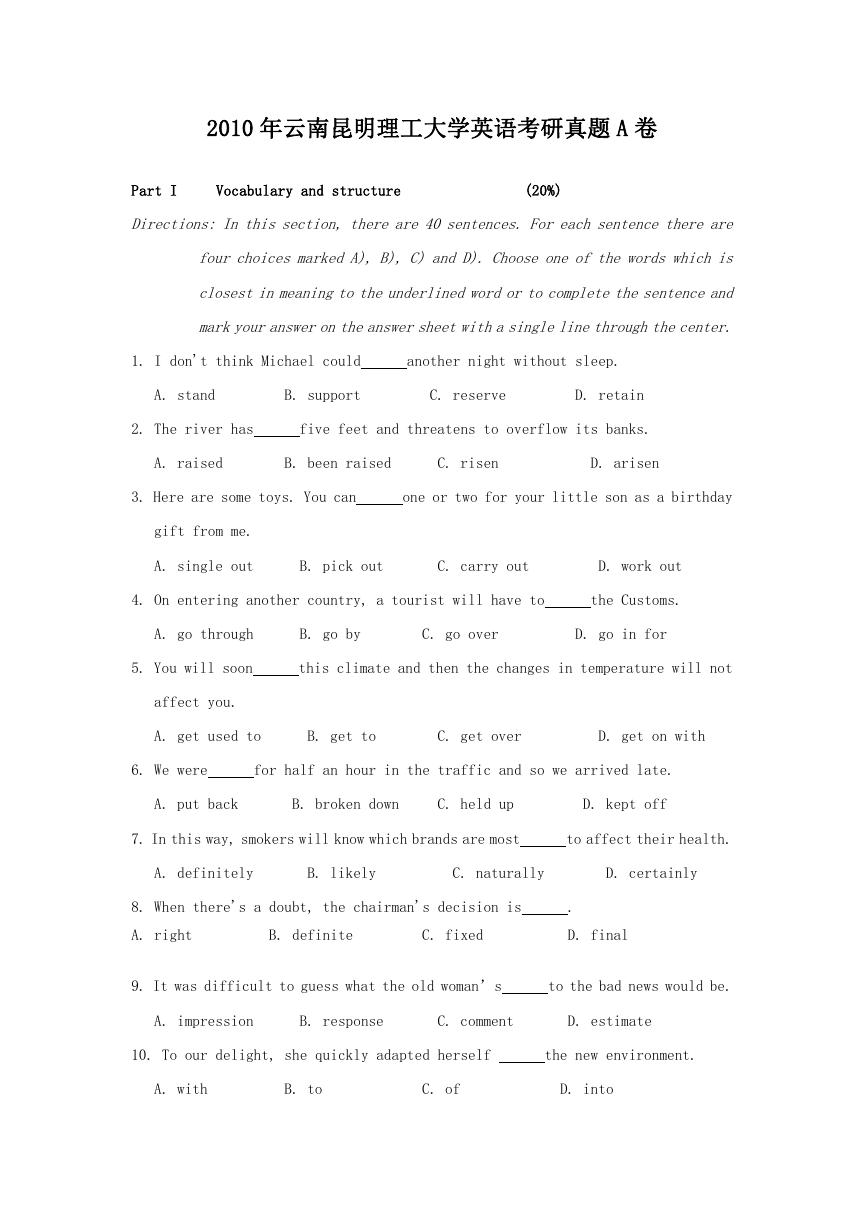
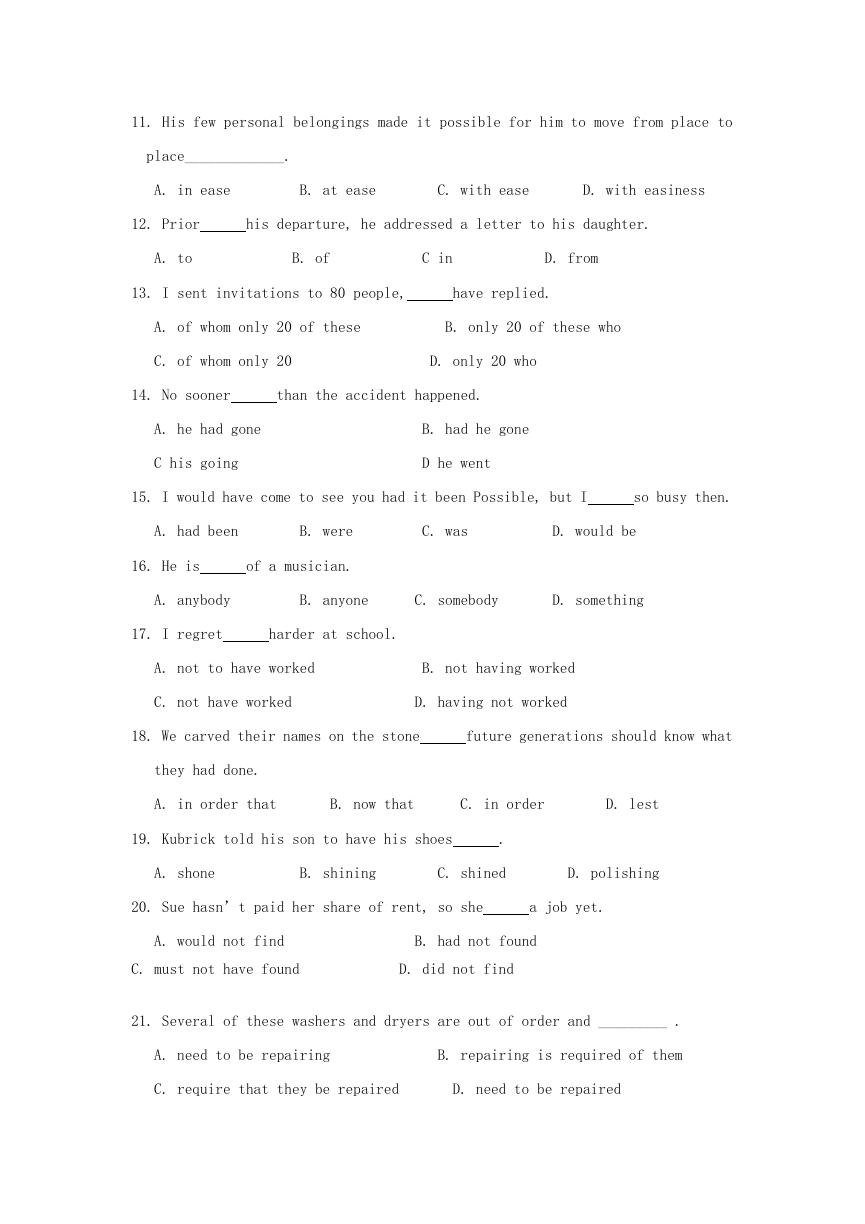
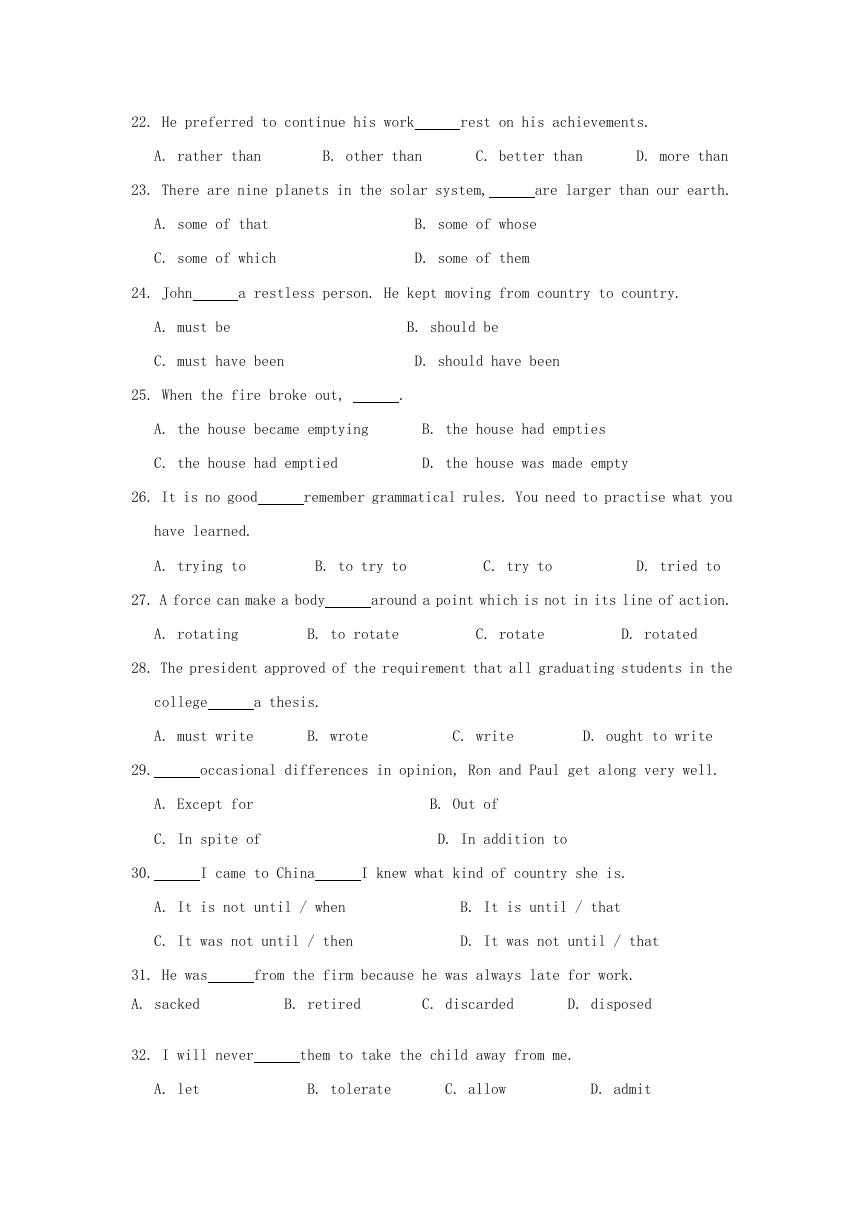
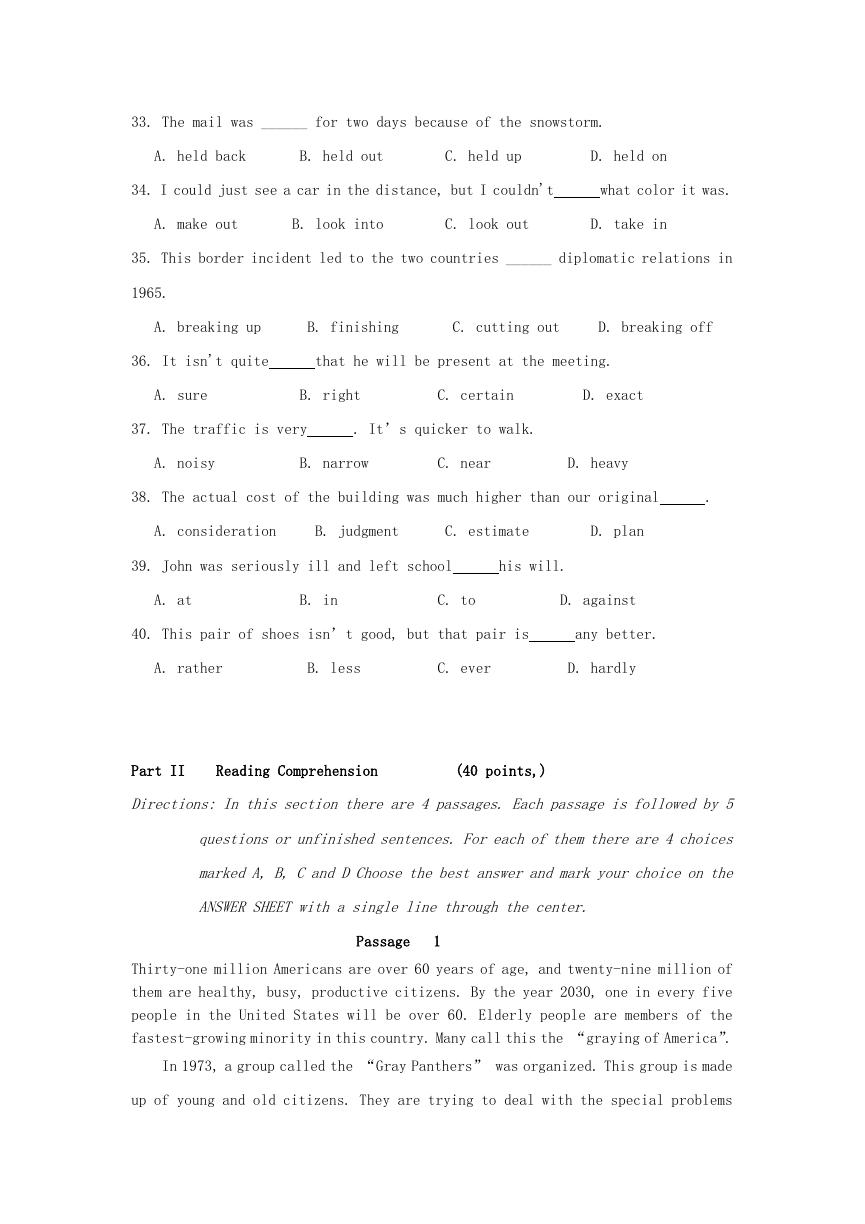
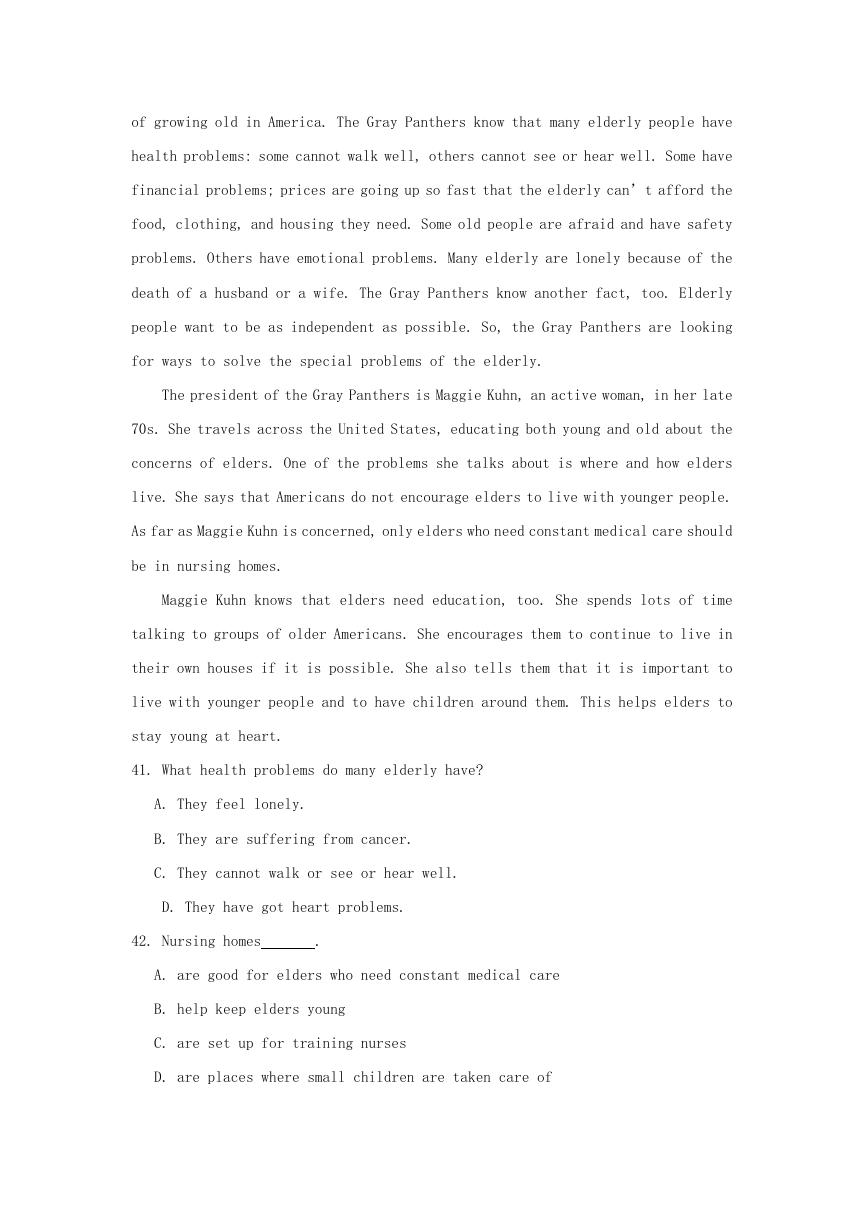
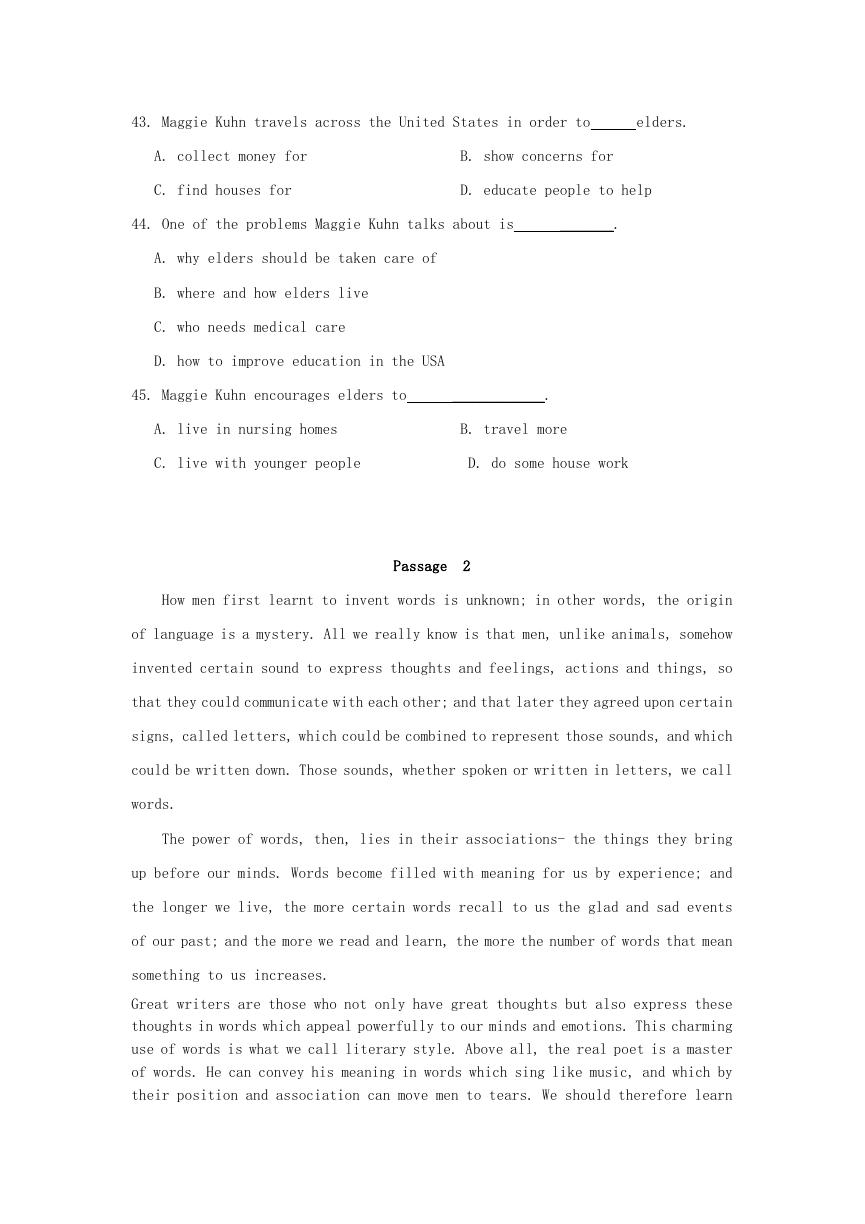
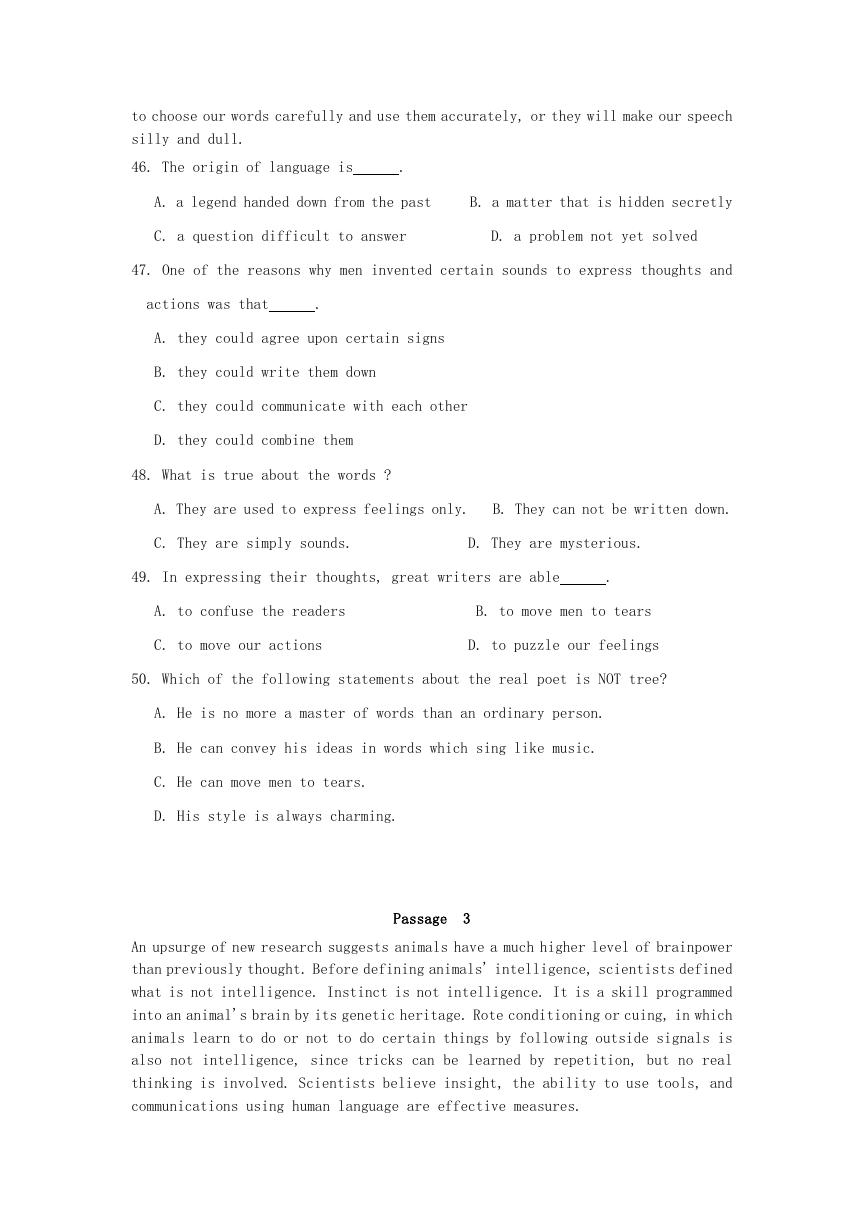
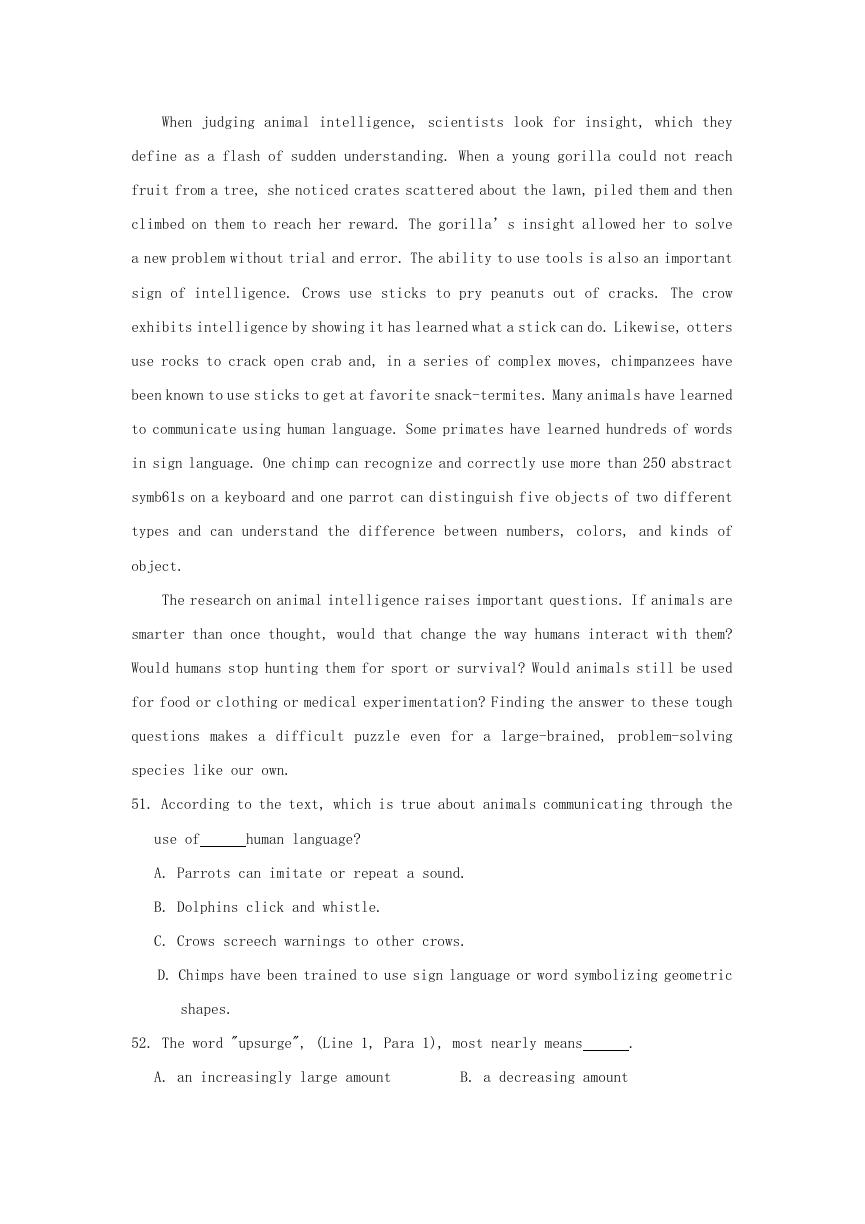








 2023年江西萍乡中考道德与法治真题及答案.doc
2023年江西萍乡中考道德与法治真题及答案.doc 2012年重庆南川中考生物真题及答案.doc
2012年重庆南川中考生物真题及答案.doc 2013年江西师范大学地理学综合及文艺理论基础考研真题.doc
2013年江西师范大学地理学综合及文艺理论基础考研真题.doc 2020年四川甘孜小升初语文真题及答案I卷.doc
2020年四川甘孜小升初语文真题及答案I卷.doc 2020年注册岩土工程师专业基础考试真题及答案.doc
2020年注册岩土工程师专业基础考试真题及答案.doc 2023-2024学年福建省厦门市九年级上学期数学月考试题及答案.doc
2023-2024学年福建省厦门市九年级上学期数学月考试题及答案.doc 2021-2022学年辽宁省沈阳市大东区九年级上学期语文期末试题及答案.doc
2021-2022学年辽宁省沈阳市大东区九年级上学期语文期末试题及答案.doc 2022-2023学年北京东城区初三第一学期物理期末试卷及答案.doc
2022-2023学年北京东城区初三第一学期物理期末试卷及答案.doc 2018上半年江西教师资格初中地理学科知识与教学能力真题及答案.doc
2018上半年江西教师资格初中地理学科知识与教学能力真题及答案.doc 2012年河北国家公务员申论考试真题及答案-省级.doc
2012年河北国家公务员申论考试真题及答案-省级.doc 2020-2021学年江苏省扬州市江都区邵樊片九年级上学期数学第一次质量检测试题及答案.doc
2020-2021学年江苏省扬州市江都区邵樊片九年级上学期数学第一次质量检测试题及答案.doc 2022下半年黑龙江教师资格证中学综合素质真题及答案.doc
2022下半年黑龙江教师资格证中学综合素质真题及答案.doc